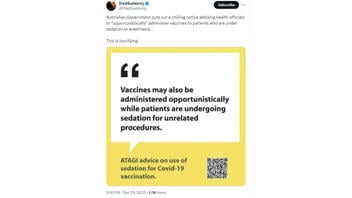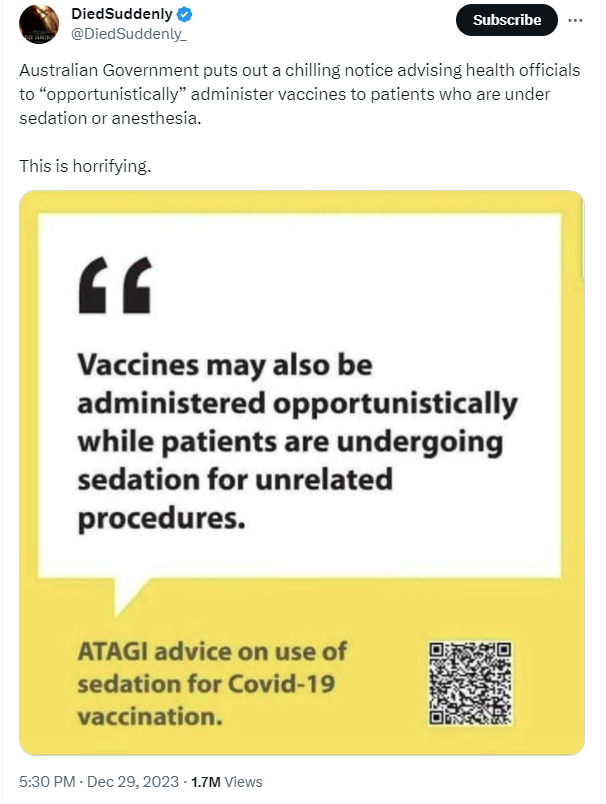
Did the Australian government recommend vaccinating patients for COVID-19 without consent, while the patient was under sedation? No, that's not true: There is no official support for such a claim. The Australian Technical Advisory Group on Immunisation, part of the nation's Department of Health, stated the opposite in an advice document dated April 6, 2022: "Sedation should not be used as a measure to enforce compliance with vaccination requirements."
The claim appeared in a post (archived here) published on X (formerly Twitter) by DiedSuddenly on December 29, 2023, under the title "Vaccines may also be administered opportunistically while patients are undergoing sedation for unrelated procedures." The post's caption said:
Australian Government puts out a chilling notice advising health officials to 'opportunistically' administer vaccines to patients who are under sedation or anesthesia.
This is horrifying.
This is what the post looked like on X at the time of writing:
(Source: X screenshot taken on Tue Jan 2 15:25:27 2024 UTC)
Australian Technical Advisory Group on Immunisation
The quote from the Australian Technical Advisory Group on Immunisation (ATAGI) comes from page 2 of a document (archived here) released by Australia's Department of Health in April 2022 called "ATAGI advice on use of sedation for COVID-19 vaccination." The first paragraph of the document states the government health agency's aim, which is:
To provide an overview of the principles for the use of sedation as one of a range of measures to assist in the safe administration of COVID-19 vaccines.
This advice is intended to be general in nature, noting that some health services have developed, or are developing, procedural guidelines for vaccination under sedation for their context. Detailed clinical guidance should be developed collaboratively with input from anaesthetic groups, jurisdictional health services and relevant specialists.
In the "Background" section of the document, ATAGI spells out why sedation might be a viable option for some individuals seeking vaccination but emphasizes that it should not be used as a means to mandate COVID shots (bolded text, emphasis ours):
The process of administering a vaccine (i.e. giving an intramuscular injection) may cause severe anxiety in some individuals with anxiety disorders or needle-phobia, and/or may be difficult in certain individuals with behavioural disorders. A tiered approach initially using non-pharmacological measures may assist in facilitating vaccination. In patients where non-pharmacological techniques have failed, sedation may facilitate safe administration of vaccines in some special circumstances. Informed consent must be obtained prior to each dose from the patient themselves, or, where the patient does not have capacity to give consent, from the parent, guardian or substitute decision-maker. Sedation should not be used as a measure to enforce compliance with vaccination requirements.
The U.S. National Library of Medicine (archived here) says:
Informed consent is the process in which a health care provider educates a patient about the risks, benefits, and alternatives of a given procedure or intervention. The patient must be competent to make a voluntary decision about whether to undergo the procedure or intervention.
Read more
Additional Lead Stories fact checks of claims about COVID-19 vaccines can be found here.


















